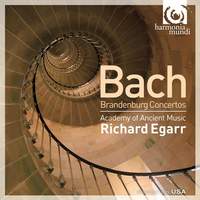Recording of the Week,
Bach's Brandenburg Concertos
Bach's six Brandenburg Concertos have become one of the most famous and best-loved collections of instrumental music ever written and- lets face it - they are truly glorious. However, they haven’t always been so highly regarded...
We don’t know exactly when, or why, Bach wrote them. What we do know is that he presented them to Christian Ludwig, Margrave of Brandenburg-Schwedt in 1721, in the hope of furthering his career. As was typical of the time he prefaced them with a suitably ‘way-over-the-top’ flattering dedication to the Margrave, which I’m giving you only the first sentence of (!) below:

"As I had the good fortune a few years ago to be heard by Your Royal Highness, at Your Highness's commands, and as I noticed then that Your Highness took some pleasure in the little talents which Heaven has given me for Music, and as in taking Leave of Your Royal Highness, Your Highness deigned to honour me with the command to send Your Highness some pieces of my Composition: I have in accordance with Your Highness's most gracious orders taken the liberty of rendering my most humble duty to Your Royal Highness with the present Concertos, which I have adapted to several instruments; begging Your Highness most humbly not to judge their imperfection with the rigor of that discriminating and sensitive taste, which everyone knows Him to have for musical works, but rather to take into benign Consideration the profound respect and the most humble obedience which I thus attempt to show Him."
However, despite this remarkable effort, it failed. As far as we know the Margrave didn’t even acknowledge them, and they were filed away unplayed and unloved in his library until his death in 1734. In fact it was the nineteenth century before the manuscript was discovered in the archives of Brandenburg and the works finally began to establish the reputation they now enjoy.
As you would imagine there is no shortage of very fine recordings. And you have a wide choice in styles as well, ranging from orchestras with very large string sections under conductors like Karajan, through smaller groups sometimes playing baroque instruments, down to chamber music versions with just one player per part.
A new recording out this week by Richard Egarr and the Academy of Ancient Music uses just one player per part and treats the whole set very much like chamber music, with Egarr directing from the harpsichord. Notably he chooses to use what is generally referred to as ‘French’ Baroque pitch (A = 392Hz). It is the first time that these concertos have been recorded at such a low pitch and it has a remarkable effect on the richness of the sound. As Richard Egarr says himself ‘it sounds like the whole music which the ensemble performs has been given a very large glass of claret’. It also has the added benefit of making some of the very high solo parts (such as the trumpet in the 2nd Concerto) slightly more playable. At this slightly lower pitch, these instruments (which often sound like they're blasting) are able to give a much gentler and more flexible performance and the balance of the ensemble is also better.
There is much to enjoy, and if you're still undecided you can explore the recordings in more detail via a special ‘microsite’ courtesy of Harmonia Mundi. There you can listen to numerous excerpts as well as watch a couple of videos, and read about the performers.
Bach, J S: Brandenburg Concertos Nos. 1-6 BWV1046-1051 (complete)
Academy of Ancient Music, ichard Egarr (harpsichord & direction)
(follow this link and then click on the speaker icon underneath the picture)
Available Formats: MP3, FLAC



